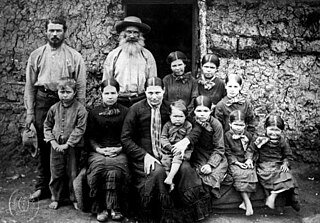
Boers are the descendants of the proto Afrikaans-speaking Free Burghers of the eastern Cape frontier in Southern Africa during the 17th, 18th, and 19th centuries. From 1652 to 1795, the Dutch East India Company controlled Dutch Cape Colony, but the United Kingdom incorporated it into the British Empire in 1806. The name of the group is derived from Trekboer then later "boer", which means "farmer" in Dutch and Afrikaans.

The first modern humans are believed to have inhabited South Africa more than 100,000 years ago. In 1999, UNESCO designated the region the Cradle of Humankind World Heritage site. South Africa's first known inhabitants have been referred to as the Khoisan, the Khwe and the San. Starting in about 400 AD, these groups were then joined by the Bantu ethnic groups who migrated from Western and Central Africa during what is known as the Bantu expansion. These Bantu groups were mainly limited to the area north of the Soutpansberg and the northeastern part of South Africa until the later Middle Iron Age, after which they started migrating south into the interior of the country.
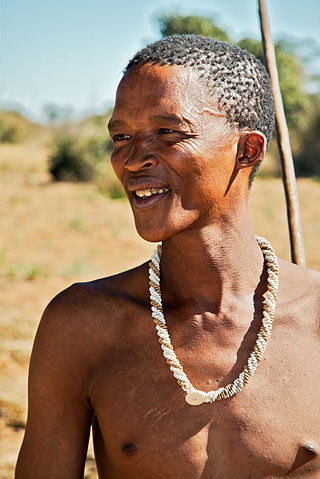
Khoisan or Khoe-Sān is a catch-all term for the indigenous peoples of Southern Africa who traditionally speak non-Bantu languages, combining the Khoekhoen and the Sān peoples. Khoisan populations traditionally speak click languages and are considered to be the historical communities throughout Southern Africa, remaining predominant until European colonisation in areas climatically unfavorable to Bantu (sorghum-based) agriculture, such as the Cape region, through to Namibia, where Khoekhoe populations of Nama and Damara people are prevalent groups, and Botswana. Considerable mingling with Bantu-speaking groups is evidenced by prevalence of click phonemes in many especially Xhosa Southern African Bantu languages.

Khoekhoe are the traditionally nomadic pastoralist indigenous population of South Africa. They are often grouped with the hunter-gatherer San peoples. The designation "Khoekhoe" is actually a kare or praise address, not an ethnic endonym, but it has been used in the literature as an ethnic term for Khoe-speaking peoples of Southern Africa, particularly pastoralist groups, such as the Griqua, Gona, Nama, Khoemana and Damara nations. The Khoekhoe were once known as Hottentots, a term now considered offensive.

Hottentot is a term that was historically used by Europeans to refer to the Khoekhoe, the indigenous nomadic pastoralists in South Africa.

Paarl is a town with 285,574 inhabitants in the Western Cape province of South Africa. It is the largest town in the Cape Winelands. Due to the growth of the Mbekweni township, it is now a de facto urban unit with Wellington. It is situated about 60 kilometres (37 mi) northeast of Cape Town in the Western Cape Province and is known for its scenic environment and viticulture and fruit-growing heritage. Paarl is a colonial town founded by Dutch colonizers who violently seized Cocoqua Khoikhoi lands and massacred many a Khoikhoi people in the process. Paarl's colonial society was also a heavily dependent on enslaved people.

The Griquas are a subgroup of mixed-race heterogeneous formerly Xiri-speaking nations in South Africa with a unique origin in the early history of the Dutch Cape Colony. Like the Boers they migrated inland from the Cape and in the 19th century established several states in what is now South Africa and Namibia. The Griqua consider themselves as being South Africa’s first multiracial nation with people descended directly from Dutch settlers in the Cape, and local peoples.

Qonce, formerly King William's Town, is a town in the Eastern Cape province of South Africa along the banks of the Buffalo River. The town is about 60 kilometres (37 mi) northwest of the Indian Ocean port of East London. It has a population of around 35,000 inhabitants and forms part of the Buffalo City Metropolitan Municipality.
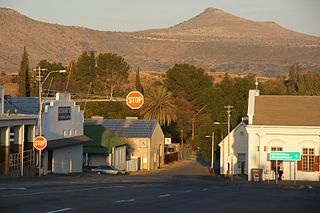
Cradock, officially Nxuba, is a town in the Eastern Cape Province of South Africa, in the upper valley of the Great Fish River, 250 kilometres (160 mi) by road northeast of Port Elizabeth. The town is the administrative seat of the Inxuba Yethemba Local Municipality in the Chris Hani District of the Eastern Cape.

The Oorlam or Orlam people are a subtribe of the Nama people, largely assimilated after their migration from the Cape Colony to Namaqualand and Damaraland.

The Khoikhoi–Dutch Wars refers to a series of armed conflicts that took place in the latter half of the 17th century in what was then known as the Cape of Good Hope, in the area of present-day Cape Town, South Africa, fought primarily between Dutch colonisers, who came mostly from the Dutch Republic and the local African people, the indigenous Khoikhoi.

Although the Portuguese basked in the nautical achievement of successfully navigating the cape, they showed little interest in colonization. The area's fierce weather and rocky shoreline posed a threat to their ships, and many of their attempts to trade with the local Khoikhoi ended in conflict. The Portuguese found the Mozambican coast more attractive, with appealing bays to use as waystations, prawns, and links to gold ore in the interior.

The Nguni people are a linguistic cultural group of Bantu cattle herders who migrated from central Africa into Southern Africa, made up of ethnic groups formed from iron age and proto-agrarians, with offshoots in neighboring colonially-created countries in Southern Africa. Swazi people live in both South Africa and Eswatini, while Ndebele people live in both South Africa and Zimbabwe.
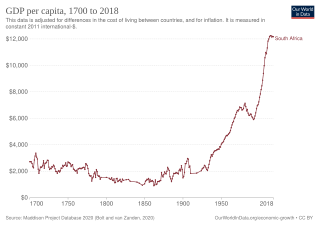
Prior to the arrival of the European settlers in the 17th century the economy of what was to become South Africa was dominated by subsistence agriculture and hunting.

Peter Kolbe was a German teacher, astronomer, ethnologist, traveller, and explorer of South Africa. His major work was the book Caput bonae spei hodiernum (1719) in which he provided detailed descriptions of Khoikhoi life which differed significantly in perception from the descriptions of earlier travellers. He compared European culture and beliefs with those of the Khoikhoi. An English translation, by Guido Medley, was published in 1731.
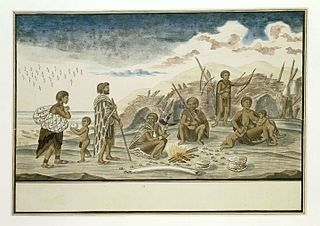
The Strandlopers are a Khoikhoi-derived people who live by hunting and gathering food along the beaches of south-western Africa, originally from the Cape Colony to the Skeleton Coast.

Makhanda, also spelled Makana and also known as Nxele, was a Xhosa indigenous doctor. He served as a top advisor to Chief Ndlambe. During the Xhosa Wars, on 22 April 1819, he initiated an abortive assault on the town of Grahamstown, in what was then the Cape Colony.
Field Commandant Christian Jacobus Groepe was a military leader of the Khoi people of Kat River, Cape Colony, in the nineteenth century.

IJsbrand Godske was the second Governor of the Dutch Cape Colony. After the death of Governor Pieter Hackius's on 30 November 1671, Godske was appointed to succeed him with the title of Governor and Councillor Extraordinary of India. For the time it took him to arrive at the Cape, first the Political Council and from 23 March 1672 to 2 October 1672, the secunde, Albert van Breugel, acted as governor.

The Battle of Salt River was a small military engagement between the crew of a Portuguese fleet led by Francisco de Almeida and the indigenous ǃUriǁʼaekua, notable for being the first military encounter between Europeans and indigenous people in what would later become South Africa. The battle resulted in a massacre of Portuguese forces and a victory for the ǃUriǁʼaekua.

















